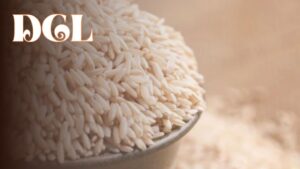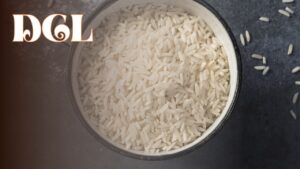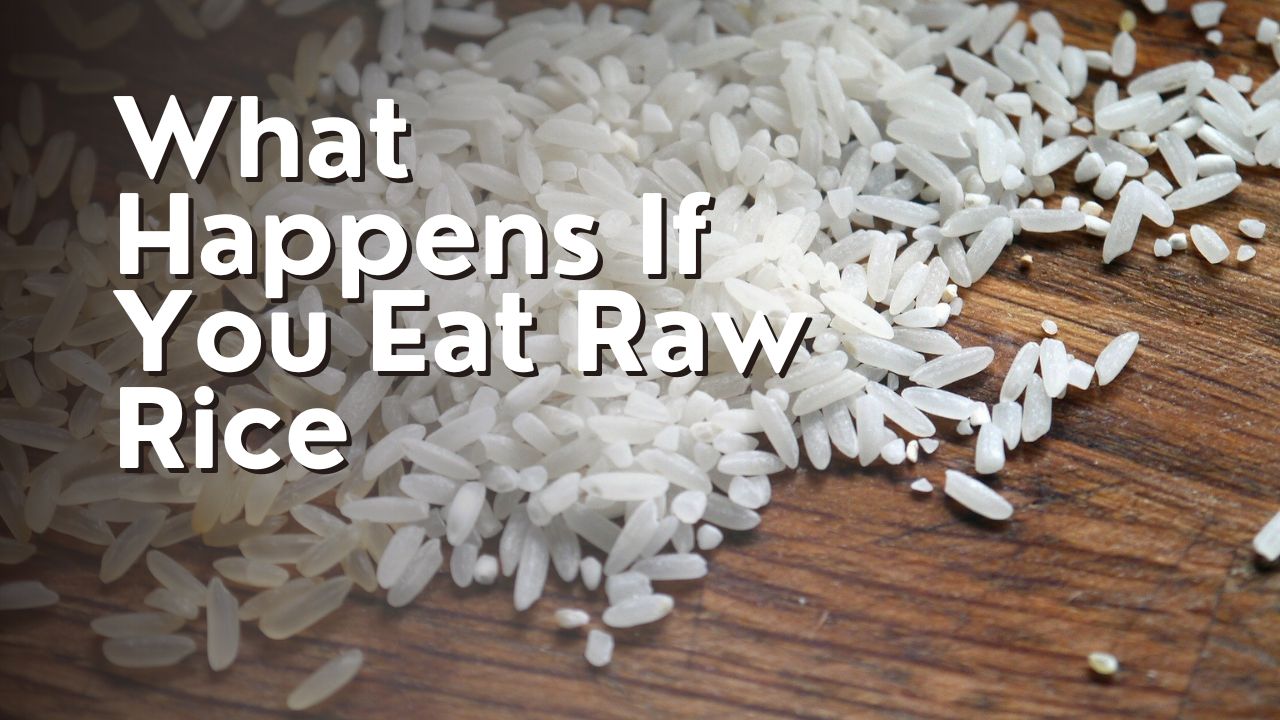Have you ever wondered what would happen if you ate raw rice? Well, I certainly did, and I decided to dig deeper to find out the potential risks and effects.
In this article, I will explore the nutritional differences between cooked and raw rice, the impact of raw rice on digestion, and potential contaminants that may be present. Additionally, I will provide safe alternatives to consuming raw rice.
So, let’s uncover the truth about eating raw rice and make informed choices about our diets.
The Potential Risks of Eating Raw Rice
If you eat raw rice, you might experience digestive issues such as stomach cramps or bloating. Raw rice contains a substance called phytic acid, which can interfere with the absorption of minerals in your body. This can lead to nutrient deficiencies and cause problems with digestion. In addition, raw rice may also contain harmful bacteria like Bacillus cereus, which can cause food poisoning. These bacteria can multiply when rice is stored improperly or cooked inadequately. Eating raw rice increases the risk of ingesting these bacteria and can result in symptoms like vomiting, diarrhea, and abdominal pain.
Furthermore, raw rice is hard and difficult to chew properly. When you eat it, there is a chance that it may not be broken down completely in your digestive system, leading to discomfort and indigestion. The hard grains can also irritate the lining of your stomach and intestines, causing inflammation and contributing to the development of gastrointestinal issues.
To avoid these potential risks, it is best to cook rice thoroughly before consuming it. Cooking rice not only softens the grains, making them easier to digest, but it also kills any bacteria that may be present. So, next time you’re craving rice, make sure to cook it properly to ensure a safe and enjoyable meal.

Nutritional Differences Between Cooked and Raw Rice
To fully understand the nutritional differences between cooked and raw rice, it’s important to consider the impact of cooking on its nutritional value. When rice is cooked, it undergoes various changes that affect its nutritional composition.
One of the main differences between cooked and raw rice is the availability of carbohydrates. Cooking rice breaks down the starch present in raw rice into a form that is easier for our bodies to digest and absorb. This means that cooked rice provides a higher amount of readily available energy compared to raw rice.
Additionally, cooking rice increases its water content. This can be beneficial as it helps to hydrate our bodies and aids in digestion. Raw rice, on the other hand, has lower water content and can be more difficult to digest. Cooking also increases the bioavailability of certain nutrients, such as vitamins and minerals, making them easier for our bodies to absorb.
However, it’s important to note that cooking rice can also lead to some nutrient loss. Heat and water exposure can cause certain vitamins and minerals to leach out of the rice. To minimize this loss, it is recommended to cook rice using the absorption method, where the rice is cooked in a limited amount of water that is fully absorbed during the cooking process.
In conclusion, cooking rice can enhance its nutritional value by increasing the availability of carbohydrates and improving the bioavailability of certain nutrients. However, it is important to cook rice properly to minimize nutrient loss.
The Impact of Raw Rice on Digestion
Cooked rice is easier to digest compared to raw rice. When we eat raw rice, our digestive system has a harder time breaking it down, leading to discomfort and potential digestive issues. Raw rice contains resistant starch, which is not easily digested by our bodies. This can cause bloating, gas, and even constipation.
Eating raw rice can also increase the risk of nutrient deficiencies. Cooking rice helps to break down the tough outer layer, making the nutrients more accessible to our bodies. When we eat raw rice, we miss out on important vitamins and minerals that are released during the cooking process.
Now, let me share with you a nested bullet point list to evoke emotion in you:
- Eating raw rice can leave you feeling heavy and bloated, making you uncomfortable throughout the day.
- Imagine the discomfort of walking around with a constant feeling of fullness in your stomach.
- Digestive issues caused by raw rice can disrupt your daily routine and leave you feeling fatigued and irritable.
- Picture yourself struggling to concentrate at work or school due to digestive discomfort.
- Nutrient deficiencies from raw rice can have long-term health consequences, affecting your overall well-being.
- Think about the impact on your energy levels, immune system, and overall vitality.
In conclusion, it’s best to stick to cooked rice for easier digestion and to ensure you’re getting the most out of its nutritional value.
Potential Contaminants in Raw Rice
When consuming raw rice, be aware of potential contaminants that may be present. Raw rice can sometimes contain harmful bacteria, such as Bacillus cereus, which can cause food poisoning if ingested. This bacterium is commonly found in soil and can contaminate rice during the growing, harvesting, or processing stages. Consuming raw rice increases the risk of ingesting these bacteria and developing symptoms like vomiting, diarrhea, and abdominal pain.
Aside from bacteria, raw rice can also contain other contaminants like pesticides and heavy metals. Pesticides are often used in rice cultivation to protect the crop from pests and diseases. However, if not properly rinsed or cooked, these pesticides can remain on the rice grains and be ingested. Similarly, heavy metals like arsenic can be present in rice due to environmental contamination. Arsenic is a toxic substance that can accumulate in the body over time and lead to various health problems.
To ensure the safety of raw rice consumption, it is important to properly cook the rice before eating it. Cooking rice kills any harmful bacteria that may be present and helps remove contaminants like pesticides. Additionally, washing rice thoroughly before cooking can help reduce the presence of contaminants.
It is always recommended to follow proper food handling and preparation practices to minimize the risk of consuming contaminated raw rice.
Safe Alternatives to Consuming Raw Rice
A safe alternative to consuming raw rice is to cook it thoroughly before eating. Cooking rice helps to eliminate potential contaminants and make it safe for consumption. When rice is cooked, it undergoes a process called gelatinization, where the starch granules absorb water and swell up. This process not only makes the rice softer and more palatable but also destroys any harmful bacteria or parasites that may be present.
To cook rice, start by rinsing it thoroughly under running water to remove any dirt or debris. Then, add the desired amount of water to a pot and bring it to a boil. Once the water is boiling, add the rice and reduce the heat to low. Cover the pot and let the rice simmer for about 15-20 minutes, or until all the water is absorbed and the rice is tender.
Cooking rice not only ensures its safety but also enhances its flavor and texture. It transforms the hard, dry grains into a fluffy and delicious staple that can be enjoyed in a variety of dishes. So, next time you crave rice, remember to always cook it thoroughly to avoid any potential risks associated with consuming raw rice.

Frequently Asked Questions
Can eating raw rice cause an allergic reaction?
Eating raw rice may not cause an allergic reaction. However, it can be difficult to digest and may lead to an upset stomach or constipation. It’s best to cook rice thoroughly before consuming.
Is it true that raw rice can expand in the stomach and cause discomfort?
Yes, it is true. Raw rice can expand in my stomach and cause discomfort. It absorbs liquid and swells, potentially leading to bloating, gas, and even stomach pain.
Are there any specific health conditions that may be worsened by consuming raw rice?
There are no specific health conditions that may be worsened by consuming raw rice. However, it is generally not recommended to eat raw rice due to the potential risk of bacterial contamination and difficulty digesting it.
Can eating raw rice lead to nutrient deficiencies?
Eating raw rice can lead to nutrient deficiencies because the body doesn’t absorb the nutrients effectively. It is important to cook rice properly to ensure that nutrients are readily available for absorption.
Is there a recommended maximum amount of raw rice that can be safely consumed?
There is no recommended maximum amount of raw rice that can be safely consumed. Eating raw rice can be harmful as it may contain bacteria or toxins that can cause food poisoning.
Conclusion
In conclusion, eating raw rice can pose various risks to our health. Raw rice lacks the nutrients that are present in cooked rice, and it can also be difficult to digest, causing discomfort and digestive issues.
Moreover, raw rice may contain contaminants that can be harmful to our bodies. It is always best to opt for safe alternatives and consume rice that has been properly cooked.
Taking necessary precautions and making informed choices can help us maintain a healthy and balanced diet.


